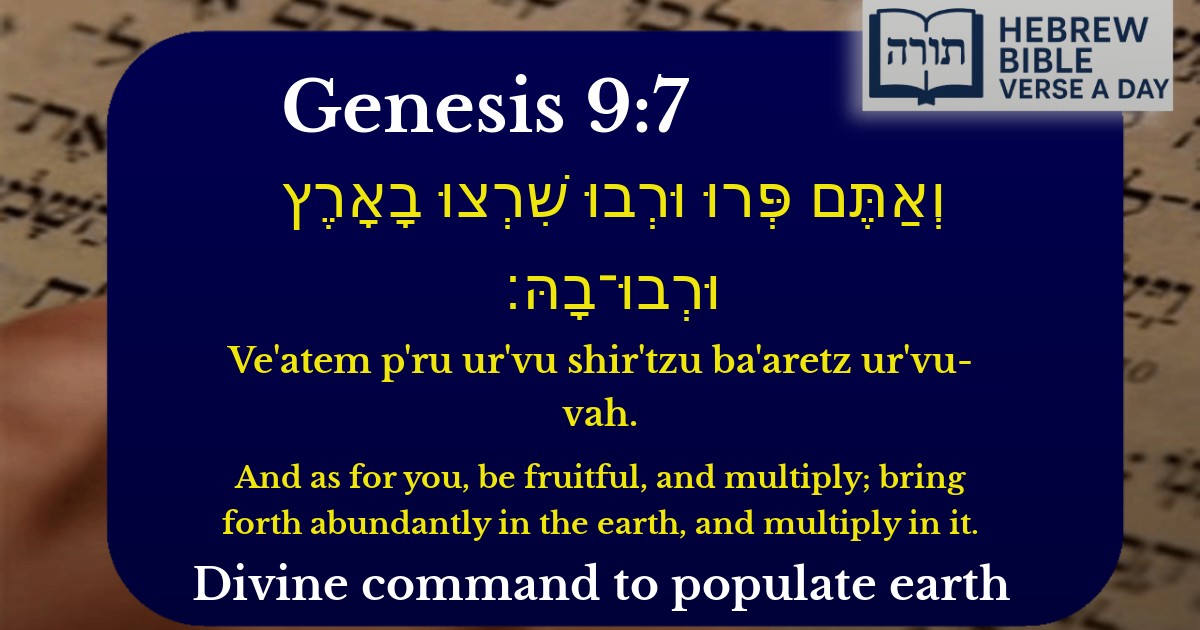Frequently Asked Questions
Q: What does 'be fruitful and multiply' mean in Genesis 9:7?
A: The verse 'be fruitful and multiply' (Genesis 9:7) is a commandment from Hashem to Noah and his sons after the flood, instructing them to repopulate the earth. According to Jewish tradition, this is the source for the mitzvah (commandment) of having children. The Rambam (Mishneh Torah, Hilchot Ishut 15:2) explains that this is one of the first commandments given to humanity.
Q: Why is the commandment to 'be fruitful and multiply' important in Judaism?
A: The commandment to 'be fruitful and multiply' is considered a fundamental mitzvah in Judaism because it ensures the continuation of the Jewish people. The Talmud (Yevamot 63b) teaches that fulfilling this mitzvah is akin to participating in the ongoing creation of the world. It is so important that the Shulchan Aruch (Even HaEzer 1:1) begins its laws of marriage with this commandment.
Q: How many children are required to fulfill 'be fruitful and multiply'?
A: According to Halacha (Jewish law), the minimal requirement to fulfill 'be fruitful and multiply' is to have one son and one daughter, as derived from the verse's wording and explained in the Talmud (Yevamot 61b). However, the Rambam (Mishneh Torah, Hilchot Ishut 15:4) states that one should continue to have children as long as they are able, as the mitzvah is not limited to just two children.
Q: Does 'be fruitful and multiply' apply to everyone?
A: The mitzvah of 'be fruitful and multiply' primarily applies to Jewish men, as it is considered a positive time-bound commandment (Talmud, Kiddushin 29a). Women are exempt from this specific mitzvah, though they obviously play an essential role in its fulfillment. There are some exceptions where rabbinic authorities may permit delaying or avoiding this mitzvah in extreme circumstances, but generally, it is considered a fundamental obligation.
Q: How does the commandment 'be fruitful and multiply' apply today?
A: Today, the mitzvah of 'be fruitful and multiply' remains a core Jewish value. Orthodox Jews view building a family as a sacred duty and a way to contribute to the Jewish future. While modern challenges like financial pressures exist, Jewish law still emphasizes this commandment's importance. The Mishna Berura (Biur Halacha 242) discusses how one should prioritize marriage and family, balancing this mitzvah with other responsibilities.


Commandment of Procreation (Pru Urvu)
The verse "וְאַתֶּם פְּרוּ וּרְבוּ שִׁרְצוּ בָאָרֶץ וּרְבוּ־בָהּ" (Bereishit 9:7) reiterates the mitzvah of procreation, first given to Adam and Chava (Bereishit 1:28). Rashi explains that this repetition after the Flood emphasizes its enduring importance, as humanity was being reestablished through Noach and his sons. The Rambam (Hilchos Ishus 15:2) codifies this as the first mitzvah in the Torah, obligating men to marry and have children.
Language and Nuances
The phrase "פְּרוּ וּרְבוּ" (be fruitful and multiply) is interpreted by the Talmud (Yevamot 62a) as requiring at least one son and one daughter to fulfill the mitzvah. The additional terms "שִׁרְצוּ" (bring forth abundantly) and "וּרְבוּ־בָהּ" (multiply in it) are expounded upon in Midrash Tanchuma (Noach 12) as encouraging not just reproduction, but settling and developing the earth.
Broader Implications
Contemporary Application
Rabbi Moshe Feinstein (Iggros Moshe, Even HaEzer 1:10) discusses how this mitzvah remains binding even in modern times, though individual circumstances may affect its fulfillment. The verse thus serves as both a personal commandment and a collective mission for Klal Yisrael to grow physically and spiritually.